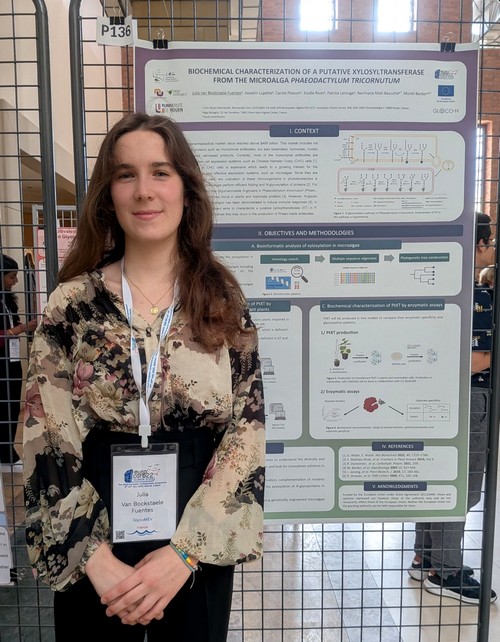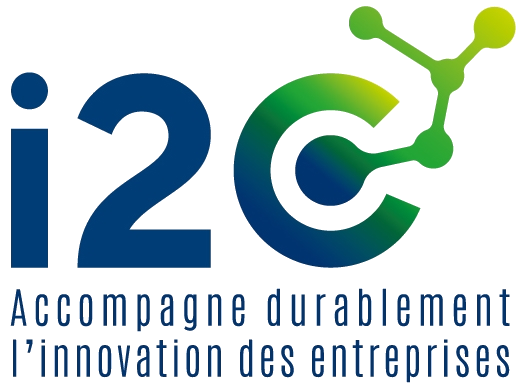Eurocarb22
Pour sa toute première conférence internationale, Julia VAN BOCKSTAELE FUENTES, doctorante au Laboratoire GlycoMEV, a eu l'opportunité de présenter un poster au symposium EUROCARB22, qui a réuni la communauté des glycosciences du 6 au 11 juillet 2025 à Gdansk, Pologne.
Son poster s'est concentré sur son projet de doctorat Glyco-N : la caractérisation des xylosyltransférases chez les microalgues, contribuant à une meilleure compréhension des voies de glycosylation dans ces organismes.
« Biochemical characterisation of a xylosyltransferase from the microalgae Phaeodactylum tricornutum. »
Julia Van Bockstaele Fuentes, Josselin Lupette, Carole Plasson, Élodie Rivet, Patrice Lerouge, Narimane Mati-Baouche, Muriel Bardor
Résumé :
In 2024, the biopharmaceutical market value reached above $469 billion. This market includes not only recombinant proteins such as monoclonal antibodies, but also biosimilars, hormones, nucleic acid and engineered cell-based products. Currently, most of the monoclonal antibodies are produced in mammalian cell expression systems, such as Chinese Hamster Ovary (CHO) cells. However, production in CHO cells is expensive. This leads to a growing interest for the development of cheaper and effective expression systems, such as microalgae. Since they are photosynthetic eukaryotic cells, the cultivation of these microorganisms in photobioreactors is inexpensive. In addition, microalgae perform efficient folding and N- glycosylation of proteins. For instance, it has been shown that the diatom Phaeodactylum tricornutum introduces on its proteins oligomannoside N-glycans that are identical to that of plants and mammals. Moreover, microalgae are classified as Generally Recognized as Safe (GRAS) strains and, therefore, microalgae have emerged as alternative cell factories for the production of biopharmaceuticals.
N-glycan xylosylation of plant-derived biologics has been demonstrated to induce immune responses. As a consequence, the present research project aims at characterizing a xylosyltransferase (XylT) in the microalgae P. tricornutum because the xylosylation of N-glycans attached to microalgae-derived biologics may impact their use in human therapy. While plant XylTs, such as Arabidopsis thaliana XylT, have been well-studied, involvement of XylTs in the N-glycosylation pathway of microalgae proteins remains poorly understood. In this context, experiments to first identify xylosylated N-glycans on P. tricornutum proteins by mass spectrometry are performed. Moreover, bioinformatic approaches allowed the identification of a putative sequence coding for a xylosyltransferase in the P. tricornutum genome. Functional complementation of plant mutants impaired in XylT activity with the gene coding for this putative XylT from P. tricornutum will help unravelling its substrate. In vitro enzymatic bioassays, using recombinant XylTs produced in heterologous systems, will be also performed to better define the substrate specificity, reaction kinetics and optimal parameters (pH, temperature).
This work is funded by the European Union under Grant Agreement 101119499 through Glyco-N project HORIZON TMA MSCA Doctoral Networks.

Participation de Julia Van Bockstaele Fuentes
![]()





 Adresse : 1er étage Bâtiment CURIB, Place E. Blondel, UFR Sciences et Techniques - Université de Rouen Normandie, F-76821 Mont Saint-Aignan CEDEX France
Adresse : 1er étage Bâtiment CURIB, Place E. Blondel, UFR Sciences et Techniques - Université de Rouen Normandie, F-76821 Mont Saint-Aignan CEDEX France Téléphone Secrétaire administrative : +33 (0)2 35 14 63 56
Téléphone Secrétaire administrative : +33 (0)2 35 14 63 56 E-mail Secrétaire administrative :
E-mail Secrétaire administrative : 

